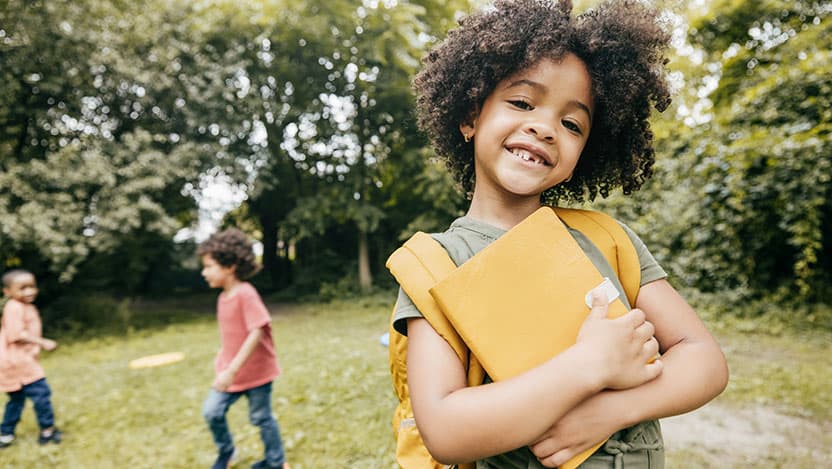A pediatrician's guide to a healthy return to school this fall

As schools reopen for fall, it’s time to make sure your children are ready for a safe return to the classroom. When it comes to your child’s health, that means scheduling physicals and immunizations. It also includes considerations to keep the return to school as healthy and stress-free as possible for students, families, teachers and staff.
Support your child’s physical and mental readiness to learn.
Your child’s school physical is their first step to a healthy start this school year. If you haven’t already, schedule a physical with their pediatrician.
The school physical isn’t just about listening with a stethoscope or immunizations. Your child will receive a full evaluation that often includes screening tests to check their vision and hearing, or blood tests to check their cholesterol or blood count depending on their age. We often discuss things like exercise habits, nutrition, and sleep patterns. As they grow older, we may also discuss making healthy decisions. As pediatricians, we also look at the child's behavior and conduct a developmental assessment to help you prepare your child for the rigors of the school environment.
We can help you identify if your child needs extra help to be successful in school and offer guidance on how to arrange getting that help. Your child will get vision and hearing tests, as well as screenings for depression in addition to other behavioral screenings. These are done at age-appropriate times to ensure your child is hitting developmental milestones.
Help protect kids from illnesses with immunizations.
To help fully protect kids against routine childhood illnesses, pediatricians make sure each child is up to date on their immunizations. These vaccines can keep your child safe from:
- Chicken pox
- MMR (measles, mumps, rubella)
- HPV (human papilloma virus, which can cause several types of cancer)
- Flu
- Pneumococcal vaccine (to protect against bacterial pneumonia, blood infection and ear infection, among other serious illnesses)
- Meningitis (meningococcal vaccine)
- Hepatitis A
- Hepatitis B (another virus linked to cancer and severe liver disease)
- Diphtheria, pertussis and tetanus (DTaP or the Tdap depending on the age of your child)
- Polio
- Hib (this vaccine protects your child against a deadly bacterium that can cause many types of infections)
- COVID-19
Teach and model healthy hand hygiene.
Continue encouraging your kids to wash their hands frequently. This helps with viruses that cause colds and can lead to pneumonia.
Do not send your child to school with symptoms.
Screen your child for symptoms often. Ask if they have any new symptoms, not normal for them at the time of year such as sore throat or runny nose. Are they coughing? Having trouble breathing? Have they lost their sense of taste or smell? Have they been having chills or fever? Are they feeling unusually fatigued or tired?
If your child is symptomatic, keep them home to help prevent or reduce the possible spread of viruses. If your child has fall allergies, it may be challenging to know exactly what is causing their symptoms. However, it’s safest to keep them home and discuss any questions with your child’s pediatrician or their allergist, if they have one.
Help protect young athletes against sports injuries and illnesses.
If your student is also an athlete, they should have a sports physical in addition to their school physical. During this type of physical, pediatricians help make sure your child can participate to the fullest extent possible in school sports. We’ll do appropriate screenings to approve whether it’s safe for your child to do activities. It’s also important that parents, caregivers, coaches and kids be aware of signs of common sports injuries and illnesses in young athletes.
Communicate with your child’s school.
Teachers and other school staff are part of your child’s team. Let them know about any needs your child has, including physical and emotional health concerns that may affect them at school. And ask the teacher over the course of the school year what your child might need from you. Teachers spend a significant amount of time with your kids and are important allies in helping children achieve all that they can.
Many children need medication while at school to treat various conditions such as ADHD, allergies, asthma, diabetes, and others. Written instructions for the school for your child’s medications may be needed. Some schools may request or need extra medication for them to give your child (e.g., an extra inhaler). If need be, please discuss this possibility with your child’s medical provider. Planning ahead can make life easier for your child and for you.

Daniel Johnson, MD
Daniel Johnson, MD, is an expert in pediatric infectious diseases and in the care of HIV-infected children. Dr. Johnson is committed to the development of community-based pediatric care in underserved areas, accomplished through partnerships with federally qualified health clinics and community hospitals.
Learn more about Dr. JohnsonQuality and Convenient Pediatric Primary Care

Schedule Online
Book a pediatric primary care appointment online right away from the comfort of your mobile device.

Set Up A Pediatric Video Visit
Save time by skipping the trip to the doctor's office and video conference with your provider instead.

Request an Appointment
Don’t have time right now? Submit an appointment request form and we’ll call you back within two days to schedule an appointment.
